固定句型及固定搭配归纳
- 格式:docx
- 大小:40.96 KB
- 文档页数:17
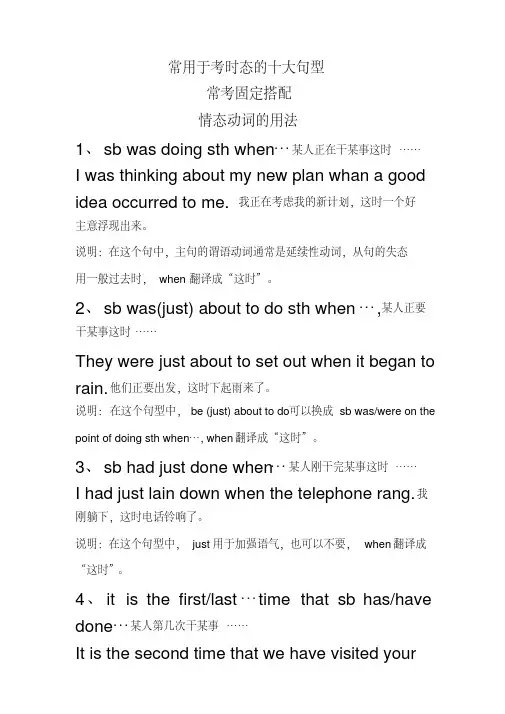
常用于考时态的十大句型常考固定搭配情态动词的用法1、sb was doing sth when…某人正在干某事这时……I was thinking about my new plan whan a good idea occurred to me. 我正在考虑我的新计划,这时一个好主意浮现出来。
说明:在这个句中,主句的谓语动词通常是延续性动词,从句的失态用一般过去时,when 翻译成“这时”。
2、sb was(just) about to do sth when…,某人正要干某事这时……They were just about to set out when it began to rain.他们正要出发,这时下起雨来了。
说明:在这个句型中,be (just) about to do 可以换成sb was/were on the point of doing sth when…, when翻译成“这时”。
3、sb had just done when…某人刚干完某事这时……I had just lain down when the telephone rang.我刚躺下,这时电话铃响了。
说明:在这个句型中,just用于加强语气,也可以不要,when翻译成“这时”。
4、it is the first/last…time that sb has/have done…某人第几次干某事……It is the second time that we have visited yourfirm.我们是第二次参观你们的公司。
说明:在“某人第几次干某事”这个句中,that之后的时态要用现在完成时,如果主句是it was…,从句时态随之换成过去完成时。
例如:It was the third time that we had seen this film star.我们是第三次看见这个电影明星。
5、Hardly had sb done…when sb did…某人刚刚干完某事这时…….Hardly had they arrived at the airport when they received a warm welcome.他们一到机场就受到了热烈欢迎。
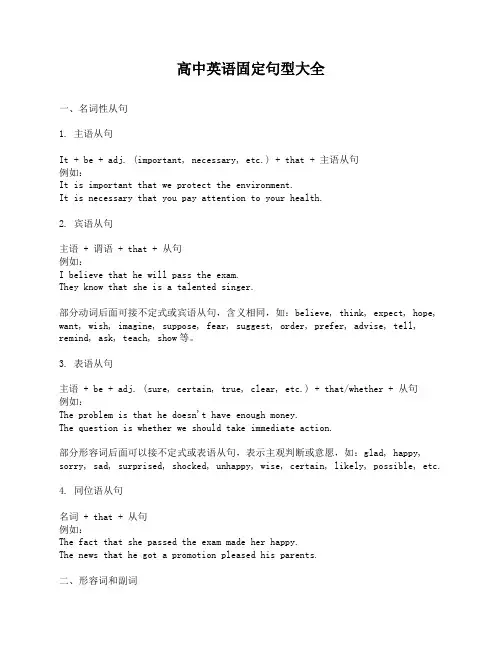
高中英语固定句型大全一、名词性从句1. 主语从句It + be + adj. (important, necessary, etc.) + that + 主语从句例如:It is important that we protect the environment.It is necessary that you pay attention to your health.2. 宾语从句主语 + 谓语 + that + 从句例如:I believe that he will pass the exam.They know that she is a talented singer.部分动词后面可接不定式或宾语从句,含义相同,如:believe, think, expect, hope, want, wish, imagine, suppose, fear, suggest, order, prefer, advise, tell, remind, ask, teach, show等。
3. 表语从句主语 + be + adj. (sure, certain, true, clear, etc.) + that/whether + 从句例如:The problem is that he doesn't have enough money.The question is whether we should take immediate action.部分形容词后面可以接不定式或表语从句,表示主观判断或意愿,如:glad, happy, sorry, sad, surprised, shocked, unhappy, wise, certain, likely, possible, etc.4. 同位语从句名词 + that + 从句例如:The fact that she passed the exam made her happy.The news that he got a promotion pleased his parents.二、形容词和副词1. 形容词的比较级和最高级比较级:主语 + be (am, is, are) + 形容词比较级 + than + 被比较的对象例如:She is taller than her sister.This book is more interesting than that one.最高级:主语 + be (am, is, are) + the + 形容词最高级 + 名词例如:He is the tallest boy in his class.This is the most beautiful painting I have ever seen.2. 常用的形容词和副词beautiful, handsome, pretty, ugly, lovely, attractive, stunning, gorgeous, charming, cute, elegant, fashionable, stylish, glamorous, delightful, etc.good, great, excellent, wonderful, fantastic, fabulous, amazing, awesome, splendid, terrific, marvelous, etc.bad, terrible, awful, horrible, unpleasant, etc.expensive, cheap, reasonable, affordable, etc.fast, slow, quick, rapid, swift, etc.loud, quiet, noisy, etc.hard, easy, difficult, challenging, simple, complicated, complex, etc.high, low, tall, short, long, big, small, huge, tiny, etc.young, old, new, ancient, modern, etc.3. 形容词和副词的用法形容词可修饰名词,也可作表语副词一般修饰动词、形容词或其他副词三、倒装句1. 完全倒装句在以下情况下要使用完全倒装句:a) 句首为表示地点、方式等的介词短语时例如:Under the tree were two cats.In this way, we can solve the problem.b) 句首为表示方位的副词或介词短语时例如:Here comes the bus.Out rushed the students.c) 句首为表示否定、副词only、hardly, seldom, never等时例如:Never have I seen such a beautiful sunset.Not only does he play the piano well, but he also sings well.d) 句首为so, neither, nor时例如:So busy was he that he forgot to eat lunch.Neither do I like English, nor do I like math.2. 部分倒装句在以下情况下要使用部分倒装句:a) 句首为表示条件的介词短语时例如:Should you need any help, please let me know.Had I known your address, I would have sent you a postcard.b) 句首为表示时间的介词短语或副词短语时例如:At no time should you give up your dream.On no account can he stay out late.四、虚拟语气1. 条件句中的虚拟语气a) “与事实相反的条件句”:如果对过去的情况进行虚拟,主句要用“动词的过去完成时”,从句用“动词的过去完成时”或“would/could/might + have + 过去分词”的形式。
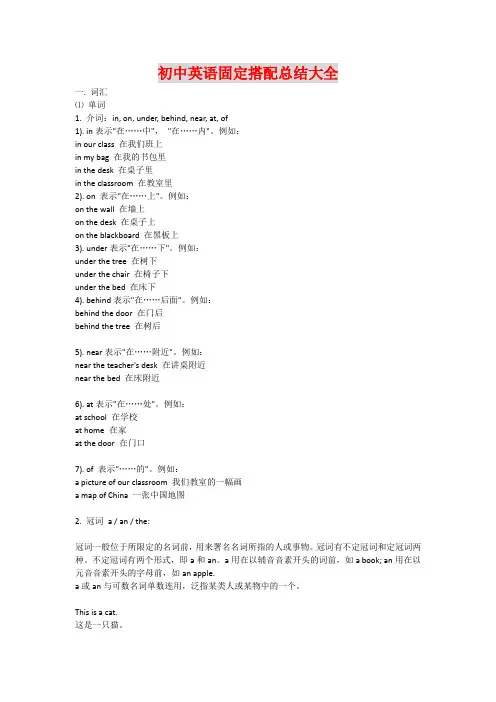
初中英语固定搭配总结大全一. 词汇⑴单词1. 介词:in, on, under, behind, near, at, of1). in表示"在……中","在……内"。
例如:in our class 在我们班上in my bag 在我的书包里in the desk 在桌子里in the classroom 在教室里2). on 表示"在……上"。
例如:on the wall 在墙上on the desk 在桌子上on the blackboard 在黑板上3). under表示"在……下"。
例如:under the tree 在树下under the chair 在椅子下under the bed 在床下4). behind表示"在……后面"。
例如:behind the door 在门后behind the tree 在树后5). near表示"在……附近"。
例如:near the teacher's desk 在讲桌附近near the bed 在床附近6). at表示"在……处"。
例如:at school 在学校at home 在家at the door 在门口7). of 表示"……的"。
例如:a picture of our classroom 我们教室的一幅画a map of China 一张中国地图2. 冠词a / an / the:冠词一般位于所限定的名词前,用来署名名词所指的人或事物。
冠词有不定冠词和定冠词两种。
不定冠词有两个形式,即a和an。
a用在以辅音音素开头的词前,如a book; an用在以元音音素开头的字母前,如an apple.a或an与可数名词单数连用,泛指某类人或某物中的一个。
This is a cat.这是一只猫。
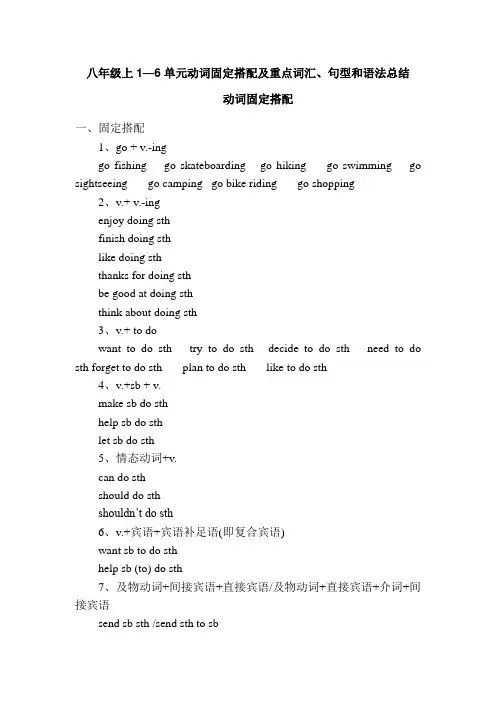
八年级上1—6单元动词固定搭配及重点词汇、句型和语法总结动词固定搭配一、固定搭配1、go + v.-inggo fishing go skateboarding go hiking go swimming go sightseeing go camping go bike riding go shopping2、v.+ v.-ingenjoy doing sthfinish doing sthlike doing sththanks for doing sthbe good at doing sththink about doing sth3、v.+ to dowant to do sth try to do sth decide to do sth need to do sth forget to do sth plan to do sth like to do sth4、v.+sb + v.make sb do sthhelp sb do sthlet sb do sth5、情态动词+v.can do sthshould do sthshouldn’t do sth6、v.+宾语+宾语补足语(即复合宾语)want sb to do sthhelp sb (to) do sth7、及物动词+间接宾语+直接宾语/及物动词+直接宾语+介词+间接宾语send sb sth /send sth to sbshow sb sth/ show sth to sbIt’s +adj +to do sth.It’s interesting to p lay computer games.It’s easy to have a healthy lifestyle.It’s important to eat a balanced diet.It’s necessary to read English every day.8、It takes sb some time to do sth(某人花多少时间做某事)It takes me ten minutes to go home on foot.It takes her half an hour to go to work by bus.It took me twenty minutes to finish my homework yesterday.二、重点词汇、句型UNIT 1 SECTION A1、go skateboarding2、go shopping3、on weekend4、go to the movies5、surf the internet6、read English books7、Animal World8、once a week9、once a year10、three times a month11、once or twice12、three or four times13、Here are the results of the students’ activity survey.14、Some students are active.15、As for speaking English,---16、Most students exercise three or four times a week.17、What’s your favorite TV program?(1 去滑滑板 2 去购物 3 在周末 4 去看电影 5 上网 6 看英语书7 动物世界8 每周一次 9 每年一次10 每月三次 11 一两次12 三四次13 这是学生活动调查的结果。
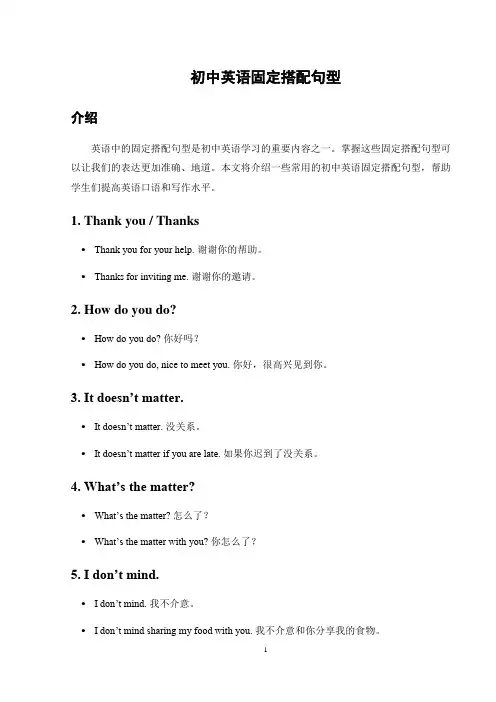
初中英语固定搭配句型介绍英语中的固定搭配句型是初中英语学习的重要内容之一。
掌握这些固定搭配句型可以让我们的表达更加准确、地道。
本文将介绍一些常用的初中英语固定搭配句型,帮助学生们提高英语口语和写作水平。
1. Thank you / Thanks•Thank you for your help. 谢谢你的帮助。
•Thanks for inviting me. 谢谢你的邀请。
2. How do you do?•How do you do? 你好吗?•How do you do, nice to meet you. 你好,很高兴见到你。
3. It doesn’t matter.•It doesn’t matter. 没关系。
•It doesn’t matter if you are late. 如果你迟到了没关系。
4. What’s the matter?•What’s the matter? 怎么了?•What’s the matter with you? 你怎么了?5. I don’t mind.•I don’t mind. 我不介意。
•I don’t mind sharing my food with you. 我不介意和你分享我的食物。
6. Can / Could I have…?•Can I have a glass of water, please? 我可以要一杯水吗?•Could I have a pen, please? 我可以借一支笔吗?7. Let’s go / Let’s do…•Let’s go shopping. 我们去购物吧。
•Let’s do our homework together. 我们一起做作业吧。
8. I’m looking forward to…•I’m looking forward to summer vacation. 我很期待暑假。
•I’m looking forward to seeing you. 我很期待见到你。
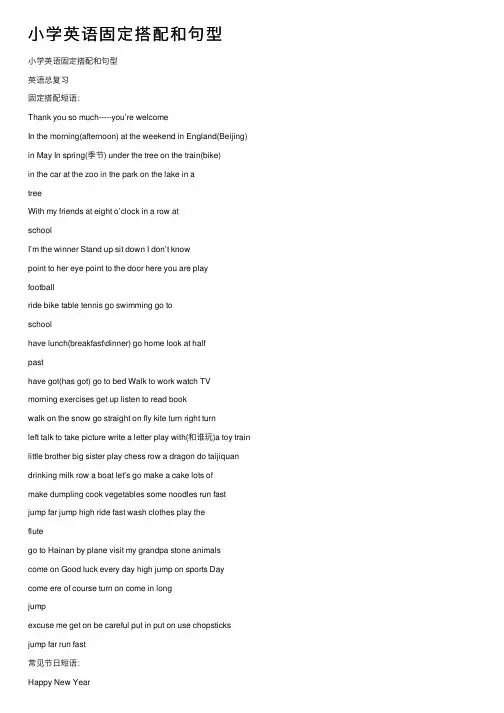
⼩学英语固定搭配和句型⼩学英语固定搭配和句型英语总复习固定搭配短语:Thank you so much-----you’re welcomeIn the morning(afternoon) at the weekend in England(Beijing) in May In spring(季节) under the tree on the train(bike)in the car at the zoo in the park on the lake in atreeWith my friends at eight o’clock in a row atschoolI’m the winner Stand up sit down I don’t knowpoint to her eye point to the door here you are playfootballride bike table tennis go swimming go toschoolhave lunch(breakfast\dinner) go home look at halfpasthave got(has got) go to bed Walk to work watch TV morning exercises get up listen to read bookwalk on the snow go straight on fly kite turn right turnleft talk to take picture write a letter play with(和谁玩)a toy train little brother big sister play chess row a dragon do taijiquan drinking milk row a boat let’s go make a cake lots ofmake dumpling cook vegetables some noodles run fast jump far jump high ride fast wash clothes play theflutego to Hainan by plane visit my grandpa stone animalscome on Good luck every day high jump on sports Day come ere of course turn on come in longjumpexcuse me get on be careful put in put on use chopsticks jump far run fast常见节⽇短语:Happy New YearMerry ChristmasHappy birthdayhave a Sports DayHappy Halloween句型总复习1、What’s your name?——My name is、、、2、How are you? ——I’m fine, thank you\ and you?3、How old are you? ——I’m eleven4、What colour?——It’s red5、What is this?\\\What’s that?——It’s a cat.6、Is it a cat?——No. It isn’t\\\\Yes. It is7、How many?—— five8、What’s your(he she ) favourite toy?——my(his her) favourite is a sheep9、What are they? They are\\\\10、Do you like milk? Yes, I do\ No, I don’t11、Does Ling ling like bananas? \Yes, she does\\No, she doesn’tDoes Damming eat peanuts at Christmas?11、What’s the time, please? It’s half past seven\\It’s one o’clockWhat’s the time, Mr. Wolf? It’s dinner time!12、What do you do at the weekend? I play footballWhat does she do in the morning? She sleeps in the morningWhat do you do in spring? I go swimming in summer!13、What do you have at school, Sam? I have Maths and Science14、Is it winter? No, It’s hot and sunny today15、Have you got a pen(bike\\)? No, I haven’t\\Yes, I haveHas Tom got a new sweater? No, he hasn’t\\\Yes, he has16、How do you go to school? I go to school by bike(I walk to school\by bus \\ by car\\) How does his father do go to work? He father go to work by car17、Where is the book? It is on the desk18、Have you got an elephant? Yes, I have \ No, I haven’t19、Where is Train 1? It’s up (down) the hill20、What are you doing? I’m listen ing to music(现在进⾏时)What is he doing?\\\What are they drinking?(singing talking)21、Do you want some rice? No, thank you\\\Yes, please22、Have you got fast food in England? Yes, we have23、Can you run fast? Yes, I can\\\No, I can’tCan I have some sweets? Yes, here you are(yes, you can)\\ sorry, you can’t Can I come in? yes, of course24、What are you going to do in the sea? I’m going to swim!25、What is he going to do in tomorrow? He is going to\\\\\26、How many birthdays are there? There are thirty27、When did you come back? I come back last SundayWhen will you come back? I will come back at next weekend28、Do you live in London?29、Did they buy ice cream? Yes, they did\\ No, they didn’t30、How many do you want? SixHow many bananas do you want?31、How much milk do you want?How much milk do you need?32、What about juice?33、Where did you go? We visited lots of places.34、What did Daming do?35、Who went to the Beijing?36、When did they go?37、How did they go?38、Whose bag is this?39、Is it Lingling’s bag?Yes, it’s hers\\\ No, it’s mine\\ it’s Jimmy’s40、There are enough\\\\There aren’t enough41、There are four children\\\\There are four pencils42、There are too many books on the desk.43、Who put them on it? Who put them in it44、There are too many peo ple, there aren’t enough cars.45、There’s not enough time!46、you can play football well.\\ I can do it very well.47、How well do you play football?48、Can you play it will?? No. I can’t play it, sorry.\\Yes, I can49、He can’t see\\find\\walk\\swim\\eat\\sit down50、What time does school start?51、What time do you get up?\\have breakfast\go to school52、Do you do exercises every morning?\\No, we don’t53、Where did Ling ling go yesterday?54、What did Ling ling do with the girls?55、What did they do then?56、What time did the bell nine?57、What time is it now? It’s 3 o’clock58、What do you do at 3 o’clock? I have music at 3 o’clock.59、What’s the matter Ling ling?\\\nothingAre you feeling sad?\bored\happy\tired\hungry------No.60、Do you miss China?61、What are you thinking about?62、Is he feeling sad? Yes, he is \\\\ No、、、、63、You should look, then cross the road.64、You shouldn’t walk in the road.以下的词后⾯接的动词必须是动词原型Do does did should can will1、⼀般现在时:be+动词⼀般时、、指平常的某个习惯动作。
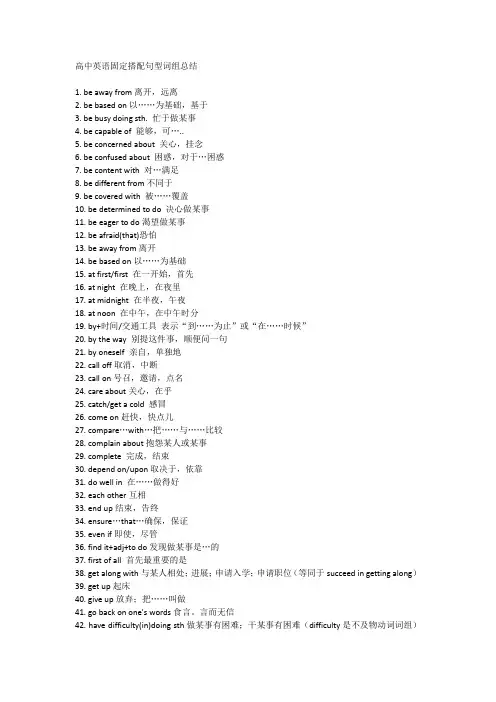
高中英语固定搭配句型词组总结1. be away from离开,远离2. be based on以……为基础,基于3. be busy doing sth. 忙于做某事4. be capable of 能够,可…..5. be concerned about 关心,挂念6. be confused about 困惑,对于…困惑7. be content with 对…满足8. be different from不同于9. be covered with 被……覆盖10. be determined to do 决心做某事11. be eager to do渴望做某事12. be afraid(that)恐怕13. be away from离开14. be based on以……为基础15. at first/first 在一开始,首先16. at night 在晚上,在夜里17. at midnight 在半夜,午夜18. at noon 在中午,在中午时分19. by+时间/交通工具表示“到……为止”或“在……时候”20. by the way 别提这件事,顺便问一句21. by oneself 亲自,单独地22. call off取消,中断23. call on号召,邀请,点名24. care about关心,在乎25. catch/get a cold 感冒26. come on赶快,快点儿27. compare…with…把……与……比较28. complain about抱怨某人或某事29. complete 完成,结束30. depend on/upon取决于,依靠31. do well in 在……做得好32. each other互相33. end up结束,告终34. ensure…that…确保,保证35. even if即使,尽管36. find it+adj+to do发现做某事是…的37. first of all 首先最重要的是38. get along with与某人相处;进展;申请入学;申请职位(等同于succeed in getting along)39. get up起床40. give up放弃;把……叫做41. go back on one's words食言。
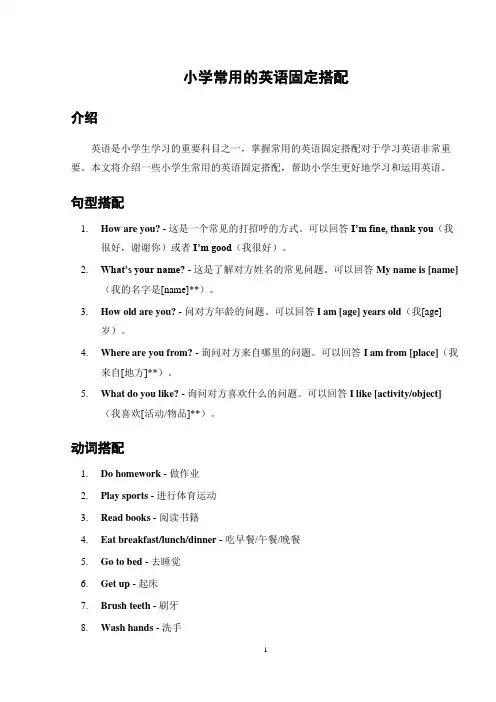
小学常用的英语固定搭配介绍英语是小学生学习的重要科目之一,掌握常用的英语固定搭配对于学习英语非常重要。
本文将介绍一些小学生常用的英语固定搭配,帮助小学生更好地学习和运用英语。
句型搭配1.How are you? - 这是一个常见的打招呼的方式。
可以回答I’m fine, thank you(我很好,谢谢你)或者I’m good(我很好)。
2.What’s your name? - 这是了解对方姓名的常见问题。
可以回答My name is [name](我的名字是[name]**)。
3.How old are you? - 问对方年龄的问题。
可以回答I am [age] years old(我[age]岁)。
4.Where are you from? - 询问对方来自哪里的问题。
可以回答I am from [place](我来自[地方]**)。
5.What do you like? - 询问对方喜欢什么的问题。
可以回答I like [activity/object](我喜欢[活动/物品]**)。
动词搭配1.Do homework - 做作业2.Play sports - 进行体育运动3.Read books - 阅读书籍4.Eat breakfast/lunch/dinner - 吃早餐/午餐/晚餐5.Go to bed - 去睡觉6.Get up - 起床7.Brush teeth - 刷牙8.Wash hands - 洗手名词搭配1.School bag - 书包2.Pencil case - 铅笔盒3.Lunch box - 饭盒4.Water bottle - 水瓶5.Classroom - 教室6.Playground - 操场7.Library - 图书馆8.Cafeteria - 食堂形容词搭配1.Good job - 做得好2.Hardworking student - 用功的学生3.Kind teacher - 友善的老师4.Beautiful flower - 美丽的花朵5.Big tree - 大树赞美和鼓励的搭配1.You did a great job - 你做得很棒2.Keep up the good work - 继续加油3.Well done - 做得很好4.You are doing awesome - 你做得很棒结论通过学习和掌握这些小学常用的英语固定搭配,小学生们可以更好地运用英语进行交流和表达。

六年级毕业复习资料之固定搭配1.加动词原形can/can’t + 动词原形should/shouldn’t+动词原形may+动词原形must/mustn’t+动词原形Will/won’t+动词原形do/does/did+动词原形help+动词原形have to+动词原形Shall we +动词原形祈使句动词原形开头2.+to+动词原形want +to++动词原形how +to++动词原形need +to++动词原形would like +to++动词原形Would you like + to+动原be happy +to++动词原形Let +宾格+动词原形use… to+动词原形It’s time +to+动词原形can’t wait to+动词原形to +动词原形3.+动词ingbe+动词ing no+动词ing go+动词ing like+动词ing love+动词ing start+动词ing begin++动词ingstop+动词inghow about/What about+动词ing be good at+动词ingdo well in+动词ing介词+动词ing不是祈使句,放在句子开头的动词要加ing4.后面跟形容词的动词有:be, keep, look, feel, get, stay, become, make, smell, sound,turn.5. 量词:a lot of 许多/some一些+ 可数名词复数或不可数名词a lot 许多,后面不可跟名词,Don’t eat a lot. 不要吃太多a lot of noodles/bread 许多面条/面包some vegetables/water 一些蔬菜/水a few 几个+可数名词复数 a few eggs 几个鸡蛋a little 一点+不可数名词 a little cola 一些可乐针对上述量词提问用how many 多少many 许多+可数名词复数many toys 许多玩具much 许多+不可数名词much tea 许多茶too many 太多+可数名词复数too many students 太多学生too much 太多+不可数名词too much milk 太多牛奶6. the的用法1. 球类前面不加the play football/table tennis 踢足球/打乒乓球2. 月份前面不加the in January/February 在一月/在二月3. 乐器前面加the play the piano/guitar 弹钢琴/吉他4. 四个传统节日加the the Spring Festival 春节Dragon Boat Festival 端午节Mid-Autumn Festival 中秋节Double Ninth Festival 重阳节5. holiday 前加the the National Day holiday 国庆节on holiday 度假中,没有the6. 景点前加the the Bund 上海外滩the Shanghai Museum 上海博物馆the Great Wall 长城the Palace Museum 故宫the Summer Palace 颐和园Tian’anmen Square 前面不加the7. 序数词前加the on the second floor 在二楼the third girl第三个女孩日期:the +序数词+of +月份8. 其他the next day 第二天7in 的用法1. 在…里/上in the kitchen 在厨房in the forest 在森林里in the playground 在操场上in the tree 在树上指不长在树上the apples on the tree 树上的苹果on the tree 在树上指长在树上的the monkeys on the tree 树上的猴子2. 时间in the morning/afternoon/evening 在早上/下午/晚上in May / June 在五月/六月in three days 三天内in the future 在将来/未来3. 其它in a healthy diet 在健康的饮食in your meals 在你的餐点中go in 进入in front of 在…前面方位上的before 在……之前时间上的in front of the house 房子前面before bedtime 睡前8on的用法1. 某一天前用on1 on Monday/Tuesday/Wednesday/Thursday 在周一/周二/周三/周四2 on the second of March 在三月二日3 on Mother’s Day 在母亲节4 on your birthday 在你生日2. 某一天的早中晚on Friday morning在周五早上on Saturday afternoon在周六下午on Sunday evening在周日晚上on Chinese New Year’s Eve 在除夕夜3. 其它on your left/right 在你左边/右边put on 穿上take off 脱下put on a play 上演/表演一出戏try on 试穿get on 上车get off下车from then on 从那时起go on 继续go well 进展顺利9at的用法1.时间at eleven o’clock 在十一点at night 在夜里at weekends 在周末at a time 一次at Christmas 在圣诞节at Chinese New Year 在中国新年at this festival 在这个节日at first 起先,最初at last 最后2. 地点at school 在学校at home 在家at Mike’s house 在麦克家at the party 在派对at a snack bar 在小吃店at a shopping centre 在购物中心at Park Station 在公园站at the train station 在火车站at the bus stop在公交车站at the traffic lights 在交通信号灯处at the school gate 在校门口3. 其它point at…指着,指向point at the king 指着国王laugh at 笑,大笑laughed过去式laugh at me 笑我shout at 朝……喊shout at that old man 朝那个老人喊10V. sb. sth.=V. sth. to sb.1. show sb. sth. = show sth. to sb. 给某人看某物/向某人展示某物show me your new clothes=show your new clothes to me 为我看你的新衣服2. give sb. sth. =give sth. to sb. 给某人某物/把某物给某人give him a book = give a book to him 给他一本书/把一本书给他3. send an email to her = send her an email 给她发封邮件/发封邮件给她4. write letters to them = write them letters 给他们写信/写信给他们11句型What …. 询问什么,用具体的事情回答;Where… 询问地点,用地点回答;WhenWhat time…. 询问时间,时间回答;Who… 询问某人,回答要用某人来回答;Who是单数,Who is the tall man He’s my father .Who runs fast Mike does.Whose … 询问是谁的,要用某人的回答;How… 1. 询问方式,交通工具2. 询问身体状况3. 询问过得如何,假期等;How many …. 询问数量多少,要用数字或者数量词来回答;How much … 询问价钱,要用…yuan 来回答;How old … 询问年龄,用年龄数字回答;Why… 询问原因,要用because回答;What day … 询问星期,用星期回答;What date… 询问日期, 用日期回答;What’s +地点There be 回答;there be 临近原则,无论出现多少东西,只看第一样是单复数还是不可数What’s this/that It’s a/an 回答;What’s wrong with … ……怎么样疾病回答;What would you like I’d like ….Would you like some cakes Yes, please./ No, thank you.Would you like to join us Yes, I’d likelove to.打电话:Who’s that你是谁This is Nancy speaking. 我是南希; 祈使句,动词原形开头,否定前面加don’t感叹句:What a + 名词What a big cakeHow +形容词+ 名词+ be How big the cake isIt’s time for+ 名词; It’s time for breakfast . 是早饭时间了;It’s time to + 动词原形; It’s time to have dinner. 是吃晚饭的时间了;any, or , either也用于问句或否定句12交通工具介词短语动词短语步行on foot walk I go to school on foot.I walk to school乘公交车by bus take a bus I go home by bus.I take a bus home.骑自行车by bike ride a bike乘地铁by metro take a metro乘出租车by taxi take a taxi乘飞机by plane take a plane乘小汽车by car take a car乘轮船by ship take a ship乘船by boat take a boat13其它固定搭配1. looklook at 看……= have a look at l ook at the blackboard 看黑板look for 寻找强调过程look for my kite 寻找我的风筝find找到强调结果find my kite 找到了我的风筝look after 照顾look after their grandparents 照顾他们的爷爷奶奶take care of 爱护;照顾take care of children’s teeth 照顾孩子们的牙齿care about 关心,在乎care about our teeth 关心/在乎我们的牙齿look out 当心Danger Please look out . 危险当心look out for 当心,提防look out for cars 当心汽车look out of …朝……看look out of the window 朝窗外看2. here/there/home 前面没有tocome here 过来go there 去那儿get there 到达那come/go home 回家get home 到家例外:go to your home 去你家get to my home 到我家3. walkwalk on 继续走walk by 走过,路过walk through 穿过4. upwake…up 吵醒,叫醒wake the lion up 吵醒狮子pick …up 捡起pick it/them up 把它/它们捡起来代词it,them 放中间climb up 爬上climb up the hill 爬上小山get up 起床5. awayfly away 飞走drive…away 赶走go away 走了,离开move…away from …从…搬走6. into/ontopour…into 把……倒入go into 走进,进入hold onto 抓紧take…into…带入…… turn into变成7.其它词:about, with, from, for, around 等chee r for…欢呼cheer for them为他们欢呼ask…for help 向……求助ask me for help向我求助be good for…对……有益be good for your body 对你的身体有益be bad for… 对……有害be bad for your eyes 对你的眼睛有害be late for… 迟到be late for school 上学迟到be ready f or… 准备好…… be ready for class 准备好上课be afraid of … 害怕…… be afraid of bears 害怕熊buy …for… 为……买…… buy a present for my friend 为我的朋友买个礼物buy…from… 从…..买…… buy things from shops 从商店里买东西make….for….为….做…… make a card for your mother 为你妈妈做张贺卡write… for… 为……写…… write stories for children 为孩子们写故事bring…from…从……带…… bring some fruit from home 从家里带些水果bring…for… 为……带…… bring a book for me 为我带本书bring…to…带……去…… bring snacks to the party 带零食去派对get … from… 从……得到…… get red packets from my grandparents从我祖父母那得到红包wait for… 等待…… wait for the bus 等公交wait for me 等我read newspapers for news 读报获取新闻watch news on the Internet 网上看新闻be/go on an outing 远足have a picnic 野餐far from 离……远comebe from 来自make a sentence with …用……造句play with… 和……一起玩show …around 带……参观travel around the world 环游世界learn about… 学习…… talk about… 谈论……tell you about The UK 告诉你关于英国的事be excited about 对……兴奋ask …about…. 问….关于…… ask Sam about Bobby 向山姆问关于鲍比的事ask me about the book 向我问那本书want to be a cook 想成为一个厨师leave … behind 留下,丢下come out /get out 出来find out 发现go back to …回去how long 多久just then 就在那时just right 正合适,正好let … go 释放,放开next to 在……旁边brush one’s teeth 刷牙do one’s homework 做家作make friends 交朋友like…very much 非常喜欢…… like running very much 非常喜欢跑步have a good greattime , have a lot of fun, have some fun 过得开心,玩得快乐between two boys两个男孩之间have a try试一试make snowmen堆雪人fly a kitefly kites 放风筝be busy 忙碌的fall into 摔倒slip on 滑倒project 课题do a project做/研究个课题poster 海报make a poster做张海报little小的,年幼的 a little boy 一个小男孩litter 乱扔垃圾letter 信。
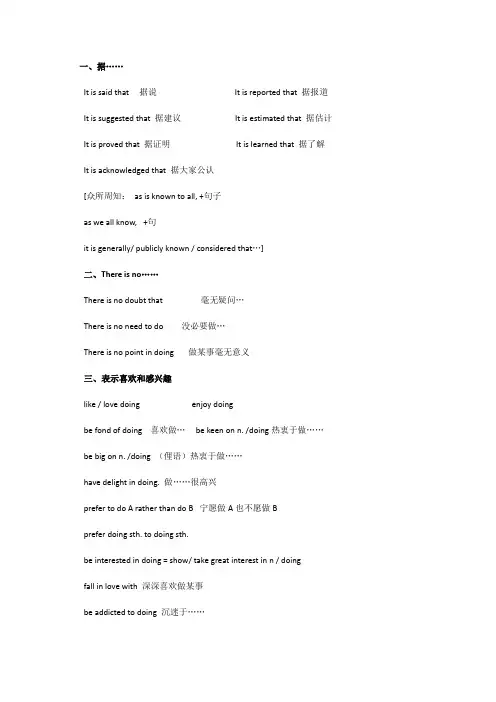
一、据……It is said that 据说It is reported that 据报道It is suggested that 据建议It is estimated that 据估计It is proved that 据证明It is learned that 据了解It is acknowledged that 据大家公认[众所周知:as is known to all, +句子as we all know, +句it is generally/ publicly known / considered that…]二、There is no……There is no doubt that 毫无疑问…There is no need to do 没必要做…There is no point in doing 做某事毫无意义三、表示喜欢和感兴趣like / love doing enjoy doingbe fond of doing 喜欢做…be keen on n. /doing热衷于做……be big on n. /doing (俚语)热衷于做……have delight in doing. 做……很高兴prefer to do A rather than do B 宁愿做A也不愿做Bprefer doing sth. to doing sth.be interested in doing = show/ take great interest in n / doingfall in love with 深深喜欢做某事be addicted to doing 沉迷于……can’t tear sb. away from 无法分开,痴迷四、努力做…try to do努力做…strive to do 努力做…try one’s best to do = do one’s best to do 竭尽全力做…make efforts to do = make every effort to do 尽力做…do what sb can (do ) to do 尽力做…spare no effort to do 不遗余力的做…do what / everything sb. can to do 尽某人全力做…五、打算做…/ 计划做…/ 想要做intend / plan to do 打算做…be going to do 打算做…decide to do 决定做…determine to do 决定做…be determined to do 决定做…make up one’s mind to do 下定决心做…want to do 想做…would like to do 想做…hope to do 希望做…expect to do 期待着做…wish to do 希望做…consider doing 考虑做…六. 只加doing 作宾语的动词finish, practice, enjoy, mind, avoid, imagine, fancy, suggest, avoid,固定句型look forward to doing 盼望做…keep on doing 坚持做…dream of doing 梦想做…can’t help doing 情不自禁地做…keep / stop / prevent sb. from doing 阻止某人做…be busy (in ) doing be busy with + 名词忙于做…spend time / money (in )doing spend time / money on + 名词花费时间做…have fun / have a good time / enjoy oneself doing 玩得开心have trouble / have problem / have difficulty (in) doing 或with + 名词做…有困难get used to/ be accustomed to doing 习惯做某事devote to doing 奉献做……。
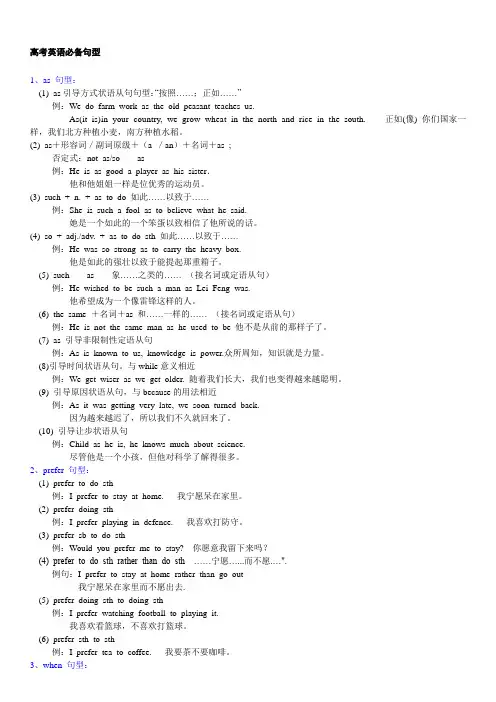
高考英语必备句型1、as 句型:(1) as引导方式状语从句句型:“按照……;正如……”例:We do farm work as the old peasant teaches us.As(it is)in your country, we grow wheat in the north and rice in the south. 正如(像) 你们国家一样,我们北方种植小麦,南方种植水稻。
(2) as+形容词/副词原级+(a /an)+名词+as ;否定式:not as/so --- as例:He is as good a player as his sister.他和他姐姐一样是位优秀的运动员。
(3) such + n. + as to do 如此……以致于……例:She is such a fool as to believe what he said.她是一个如此的一个笨蛋以致相信了他所说的话。
(4) so + adj./adv. + as to do sth 如此……以致于……例:He was so strong as to carry the heavy box.他是如此的强壮以致于能提起那重箱子。
(5) such --- as--- 象……之类的…… (接名词或定语从句)例:He wished to be such a man as Lei Feng was.他希望成为一个像雷锋这样的人。
(6) the same +名词+as 和……一样的…… (接名词或定语从句)例:He is not the same man as he used to be 他不是从前的那样子了。
(7) as 引导非限制性定语从句例:As is known to us, knowledge is power.众所周知,知识就是力量。
(8)引导时间状语从句。
与while意义相近例:We get wiser as we get older. 随着我们长大,我们也变得越来越聪明。
高考英语语法大全:固定搭配用法总结【重点精华】1。
It’sthe first time that……….(从句中用现在完成时)It was for the first time that………(强调句,对状语for the first time进行强调) It’s(high) time that…….。
(从句中用过去时或should do)2。
It'sthe same with sb。
/ So it is with sb。
表示某人也如此(用于前句中既有肯定又有否定或两个不同类的谓语动词)3。
…be about to do / be doing……when……。
正要做/正在做……就在那时……。
4。
A is twice / three times as +原级+as B A是B的两倍/三倍A is twice / three times the n. of B。
A的…是B的两倍/三倍A is twice / three times +比较级+thanB A比B多两倍/三倍5。
It’s a waste of time / money doing / to do…做……浪费时间/金钱It's no use / good doing……… 做……是没有用的It's possible / probable / (un)likely that………。
很可能……It makes great / no sense to do……做某事很有/没意义6。
There’s no use / g ood doing……。
做……没有用There’s no sense / point (in)doing…… 做……没有意义There is no need for sth。
/ to do……。
没有过必要做……There is (no) possibility that…………(同位语从句)很可能/没可能……7.The+比较级……..,the+比较级………越……。
初中英语固定搭配速查在学习英语的过程中,固定搭配是非常重要的部分。
掌握各种搭配可以帮助我们更流利地表达自己的意思。
下面就给大家总结了一些初中英语中常见的固定搭配,希望对大家的学习有所帮助。
1. Set off: 出发We should set off early if we want to avoid traffic.2. Break up: 分手They broke up last month, but now they are back together.3. Catch up: 赶上I need to catch up on my homework before the test.4. Bring up: 提出He brought up a very interesting point during the discussion.5. Look forward to: 期待I am looking forward to meeting you next week.6. Carry out: 执行We need to carry out the plan as soon as possible.7. Pick up: 捡起I picked up some trash on the beach yesterday.8. Put up with: 忍受I can’t put up with his bad behavior any longer.9. Run out of: 用光We ran out of milk, so I need to buy some more.10. Turn down: 拒绝He turned down the job offer because the salary was too low.11. Get along: 相处They get along really well with each other.12. Look up to: 尊敬I have always looked up to my parents.13. Give up: 放弃Don’t give up, you can do it if you try.14. Point out: 指出He pointed out the mistake in my essay.15. Run into: 偶遇I ran into an old friend at the supermarket.16. Bring about: 导致The new policy brought about a lot of changes in the company.17. Come across: 偶然遇到I came across an interesting book while browsing the library.18. Put off: 推迟The meeting has been put off until next week.19. Make up: 编造I had to make up an excuse for being late.20. Look after: 照顾She looks after her younger brother every day.掌握这些固定搭配,可以让我们的英语表达更加准确地表达我们的意思。
英语写作句型及固定搭配关于英语写作句型及固定搭配英语写作句型及固定搭配一、开头句型1.As far as…is concerned,… 就……而论When it comes to sth/doing sth. 当谈论到……(1)As far as the role of information in the future is concerned, I believe that information will play a more and more important part in people’s decision-making.(2)As far as what was mentioned above is concerned, how can we ignore the advantages travelling brings forth? 就前面所提及的而言,我们怎么可以忽视旅游带来的裨益呢?2. It goes without saying that… 不用说(1) It goes without saying that practice makes perfect. 2) It goes without saying that reading makes a full man.3. It can be said with certainty that… 可以肯定的说(1)It can …… that cultivating a hobby can add fun to our life.(2)It can ….… that because of the knowledge, we can now enjoy a comfortable life which is brought about by advanced technology. 可以肯定地说,正由于知识我们才能享受科技进步所带来的舒适生活。
小学英语常用固定搭配最全介绍英语作为一门外语,对于小学生来说是一个重要的学科。
在学习英语的过程中,掌握一些常用的固定搭配是非常有帮助的。
本文将介绍一些小学英语中最常用的固定搭配,帮助学生更好地掌握英语表达。
常用动词搭配1. go to schoolgo to school是最基础的句型之一,意思是“去上学”。
小学生每天都会用到这个搭配,因为它可以形容他们每天早上去学校学习。
2. eat breakfast/lunch/dinnereat breakfast/lunch/dinner是用来描述吃早餐、午餐和晚餐的搭配。
在小学英语中,学生会学到这几个时间词,并学会用这些时间词去描述吃饭的时间。
3. play with friendsplay with friends是形容和朋友一起玩耍的搭配。
小学生喜欢和朋友一起玩耍,这个句型是他们常用的表达方式之一。
4. do homeworkdo homework是形容做作业的搭配。
在小学阶段,学生需要完成老师布置的作业,因此do homework是一个非常重要的搭配。
常用形容词搭配1. happy birthdayhappy birthday是用来祝福生日快乐的搭配。
在小学中,学生会遇到许多同学的生日,用happy birthday来祝福是常见的表达方式。
2. big/small housebig/small house是用来形容房子大小的搭配。
小学生学习形容词的时候,会遇到big 和small,通过这个搭配可以帮助他们更好地掌握这两个形容词的用法。
3. nice to meet younice to meet you是用来表达“很高兴认识你”的搭配。
在小学阶段,学生会遇到许多新的朋友,使用这个搭配可以表达友好和热情。
4. good jobgood job是用来称赞做得好的搭配。
小学生在完成任务或者表现出色的时候,老师和家长会使用这个搭配来表达肯定和鼓励。
常用副词搭配1. very goodvery good是表示“非常好”的搭配。
初中英语常见固定搭配(一)加-ingenjoy / like doing sth 喜欢做---- spend....(in) doing sth 花费---在做---try doing 试着做----- be busy doing sth 忙于做------be doing 正在做---- finish doing sth 完成做----Thank you for (doing) sth 为了--感谢你look forward to + doing sth 期待做----(现在进行时)(二)加-todecide to do sth 决定去做----- ask (sb)to do 要求(某人)去做----It’s+adj +to do sth . 做---(怎么样) would like / want to do 想要做----It takes sb sometime to do sth在做----花费----(三)加原形let / make sb do sth 让某人做某事be going to / will do sth (一般将来时态)(四)加-to 或-ing意思不同forget doing 忘记做过了(已做) remember doing记得做过了(已做)forget to do 忘记去做(还没做) remember to do记得去做(还没做)(五)加-to 或-ing意思相同begin / start to do sth = begin / start doing sth开始做----(六)(A)动词+ 介词agree with同意....的意见(想法);符合 listen to听...help ... with ...帮助(某人)做(某事) get to到达....fall off (从......)掉下 base on以....(为)根据knock at /on敲(门、窗) laugh at嘲笑learn.. from 向...学习 live on继续存在;靠...生活look after照顾,照看 look at看;观看look for寻找 look like看起来像 pay for (sth.)付钱;支付 point at指示;指向point to指向.... prefer to ...宁愿(选择);更喜欢quarrel with (和某人)吵架 regard...as ...把....当作....;当作 stop...from阻止.....做..... talk about说话;谈话;谈论talk with与......交谈 think about考虑 think of认为;想起B)动词+ 副词ask for请求;询问 carry on坚持下去;继续下去cut down砍倒 clean up清除;收拾干净come down下来;落 come along来;随同come out出来;出现;(花)开;发(芽) come in进来come over过来;顺便来访 come on来吧;跟着来;赶快drop off放下(某物);下车 eat up吃光;吃完fall behind落在......后面;输给别人 fall down跌倒;从......落下find out查出(真相) get back回来;取回get down下来;落下;把......取下来 get on上(车)get off下来;从......下来 get up起床give up放弃 go on继续go out出去 go over过一遍;仔细检查 grow up长大;成长 hand in交上来hold on (口语)等一等;(打电话时)不挂断 hurry up赶快 look out留神;注意 look over (仔细)检查look up向上看;抬头看 pass on传递;转移到....pick up拾起;捡起 put away放好;把....收起来put on穿上;戴上;(戏剧等)上演;放(唱片)等put down把(某物)放下来 put up挂起;举起run away流失;逃跑;逃走 rush out冲出去set off出发;动身;启程 send up发射;把......往上送shut down把......关上 sit down坐下slow down减缓;减速 take off脱掉(衣服)take out取出 throw about乱丢;抛撒trip over (被......)绊倒 try out试验;尝试try on试穿(衣服、鞋等);试戴(帽子等)turn on打开(电灯、收音机、煤气、自来水)等turn off关(电灯、收音机、煤气、自来水等)turn over (使)翻过来 turn down关小;调低wake up醒来 wear out把......穿旧;磨坏work out算出;制订出 write down写下....(C) be + 形容词+ 介词be angry with对(某人)发脾气 be interested in对......感兴趣be able to能;会 be afraid of害怕be amazed at对......感到惊讶 be excited about对......感到兴奋 be filled with用......充满 be full of充满......的be late for迟到 be made in在......生产或制造be made of由....组成;由.... be pleased with对......感到满意be proud of以......自豪/高兴 be used for用于be good at =do well in在....方面做得好;善于(D)动词+ 名词/ 代词beg one´s pardon请原谅;对不起 do morning exercises做早操do one´s homework做作业enjoy oneself =have a good time过得快乐;玩得愉快 give a concert开音乐会 go boating去划船go fishing去钓鱼 go hiking去徒步旅行go skating去滑冰 go shopping (去)买东西have a cold (患)感冒 have a cough (患)咳嗽have a headache (患)头痛 have a try尝试;努力have a look看一看 have a seat (= take a seat ) 就坐;坐下have a rest休息 have sports进行体育活动have supper吃晚餐 hear of听说make a noise吵闹 make a decision作出决定make a mistake犯错误 hold a sports meeting举行运动会make faces做鬼脸 make friends交朋友make money赚钱 take photos照相take time花费(时间) take turns轮流take one´s place坐某人的座位;代替某人的职务teach oneself (=learn by oneself ) 自学 watch TV看电视(E)动词+ 名词/ 代词/ 副词+ 介词catch up with赶上 give birth to生(孩子)say good bye to告别;告辞 speak highly of称赞take care of照顾;照料;注意 take an active part in积极参加come up with找到;提出(答案、解决办法等)get on well with与......相处融洽help yourself / yourselves to自取;随便吃make room for给.....腾出地方play a joke on戏弄人;对人恶作剧(F)其他类型be awake醒着的 be born出生be busy doing忙着做 come true实现do one´s best尽最大努力 fall asleep睡觉;入睡go home回家 go on doing (sth.)继续做某事;尽力go straight along 沿着...一直往前走get married结婚 get together相聚 had better (do)最好(做...) keep doing sth.一直做某事 make sure确保;确认;查明 make up one´s mind下决心初中英语语法大全(固定搭配)1. (see 、hear 、notice 、find 、feel 、listen to 、 look at 感官动词)+doeg:I like watching monkeys jump2. (比较级 and 比较级) 表示越来越怎么样3. a piece of cake =easy 小菜一碟(容易)4. agree with sb 赞成某人5. all kinds of 各种各样 a kind of 一样6. all over the world = the whole world 整个世界7. along with同…一道,伴随…eg : I will go along with you我将和你一起去The students planted trees along with their teachers.学生同老师们一起种树8. as soon as 一怎么样就怎么样9.as you can see 你是知道的10. ask for ……求助向…要…(直接接想要的东西)eg : ask you for my book11. ask sb for sth 向某人要什么12. ask sb to do sth 询问某人某事 ask sb not to do 叫某人不要做某事13. at the age of 在……岁时eg:I am sixteen. =I am at the age of sixteen.14. at the beginning of …………的起初;……的开始15. at the end of +地点/+时间最后;尽头;末尾eg : At the end of the day.16. at this time of year 在每年的这个时候17. be /feel confident of sth /that clause +从句感觉/对什么有信心,自信 eg : I am / feel confident of my spoken English.I feel that I can pass the test.18. be + doing 表:1 现在进行时 2 将来时I am watching now.I am going to the zoo tomorrow.19. be able to (+ v 原) = can (+ v 原)能够……eg : She is able to sing She can sing20. be able to do sth 能够干什么eg :She is able to sing.21. be afraid to do /of sth 恐惧,害怕……eg : I'm afraid to go out at night. I'm afraid of dog.22. be allowed to do 被允许做什么eg: I'm allowed to watch TV.我被允许看电视。
中考英语必须掌握的“70个常见句型和固定搭配”1. allow sb. to do sth. 允许某人去做某事后接动词不定式My father allowed me to go out for a walk after finishing my homework.2. asked sb. not to do sth. 叫某人做某事叫某人不要去做某事My father asked me to study hard. He asked me not to swim alone.be asked to do sth. 被叫去做某事/被邀请去做某事I was asked to have a dinner with them yesterday.3. be afraid to do sth. 害怕做某事She is afraid to ask me questions.4. be afraid of doing sth. 害怕做某事I am afraid of going out at night.5. be afraid of sth. 害怕某物He is afraid of snakes.6. be amazed to do sth. 对做某事感到惊讶He was amazed to meet the girl there.be amazed at sth. 对某事感到惊讶They were amazed at the news.7. be busy doing/with sth. 忙于做某事常考I was busy washing my car at that time. I am busy with my work.8. becoming/going/leaving/fiying/moving/dying某些位移动词用进行时态时表将来The bus is coming/the dog is dying.9. be excited to do sth. 对做……感到兴奋Jacky was excited to travel there by plane.be excited at sth. Lily was excited at his words.be excited about doing sth.He was excited about passing the exam without going over books.10. be frightened to do sth. 害怕去做某事Sam is frightened to ride a horse.11. be glad/happy to do sth. 高兴去做某事She is happy to clean the blackboard with me.be pleased to do sth. 高兴做某事She was pleased to help the old man yesterday.be pleased with sth. 对某事感到高兴/满意The teacher was pleased with my answer.interested in sth./doing sth. 对某事感兴趣/对做某事感兴趣She is interested in swimming in the river.My brother is interested in Chinese.13. be/get ready for 为某事做好了准备We are ready for the exam. We are getting ready for the exam.be ready to do sth. 为做某事做好了准备We are ready to have a birthday party for her.14. be surprised to do sth. 对做某事感到惊奇be surprised at sth. 对某事感到惊奇This is nothing to be surprised at. I’m surprised to see him on such an occasion.15. be worth doing sth. 值得做某事worth 后接动词-ing形式,常考It was too remote to be worth thinking about.16. 开始去做某事begin to do sth. begin/start to do/doing sth.When do children begin to go to school17. can/be able to afford to buy sth. 有能力负担购买……At this rate we won't be able to afford a holiday.18. can/may/must do sth. could/would/should/might do sth.We may come at another time.19. can't wait todo sth. 迫不急待地去做某事I can’t wait to hear the news.20. decide to do sth. 决定去做某事make up one's mind to do sth. 下决心去做某事常考make a decision to do sth. 对做某事作决定What do they decide to do I have made up my mind to go with him.21. deserve to do sth. 值得/应该做……We must admit that she did deserve to win.22. encourage sb. to do sth. 鼓励某人去做某事Encourage them to do some other helpful recreations.23. enjoy doing sth. 喜欢去做某事I enjoy reading the story book24. expect sb. to do sth. 期望去做某事Don't expect him to help you.25. fail to do sth. 做某事失败succeed doing sth. 成功做了某事If you do not work, you will fail to pass the exam.26. finish doing sth. 做完某事后接动词-ing形式常考After finish doing your homework, you can have a rest.27. follow sb. to do sth. 跟随某人去做某事Follow me to read the new words.28. get sb. to do sth. / make sb. do sth./ let sb. do st 让某人做某事后接动词原形Her jokes made us laugh.29. get/have a chance to do sth. 得到一个做某事的机会I'm very happy to have a chance to visit your school.30. give/pass/show/lend/sell sb. sth./sth. to sb.buy/get/bring sb. sth./sth. for sb.Please give me a piece of paper. I bought him a drink in return for his help.31. go on to do sth. /go on doing sth. 继续做事常考Go on doing the exercise after a short rest.32. hate to do/doing sth. 讨厌/不喜欢做某事I hate to tell the news to you.33. have fun doing sth. 做某事很有趣Have fun getting to know each other.34. have problems doing sth. 做某事遇到困难Many people have problems getting to sleep at night.35. have sb. do sth./have sth. done 让某人做某事This is the best work you have ever done.36. hear sb do sth 听到某人做某事后接动词原形,常考hear sb doing sth 听到某人正在做某事常见I heard someone laughing.37. help to do sth 帮忙做某事help sb to do sth 帮助某人做某事I'll help you clean the room.38. hope/wish to do sth 希望做某事wish sb to do sth 希望某人做某事I wish to take this opportunity to thank you all.39. It seems that 这像是……后接从句seem to do sthIt seems that you are lying. Does that seem to make sense40. It’s + adj+for sb to do sth.It's glad for him to hear the news.41. It takes sb sometime/money to do sth . 花费某人多长时间做某事常考It takes me an hour to walk there and back.42. pay …for… cost /spend…on….. it take …to do sth 花费He paid for it out of his own pocket.43. It’s best for sb to do sth. 对某人来说做某事是最好的It's best for you to do more exercise.had better do sth 最好做某事注意had没有时态和人称的变化,better后接动词原形You had better go to the school.'s time for sb to do sth 是某人做某事的时候了It's time for us to have dinner.ondoing sth 坚持做某事常考John always kept on asking questions.keep sb doing sth 让某人做某事常考Don't keep me waiting.keep sb from doing sth 阻止某人做某事常考He keeps her from cutting the tree.keep sb/sth +adj 使某人保持……的状态Washing your hands keeps you healthy.to do sth 学做某事learn sth from sb 向某人学习I learn to play football. I learn the spirit from him. 我向他学习他的精神;to do/doing sth 喜欢做某事like sb to do sth 喜欢某人做某事She likes swimming. /She likes to swim this afternoon.to do sth/ need doing sth/need to be done 需要做某事The garden needs to be watered. / The garden needs watering.49. prefer to do sth rather than do sth 宁愿……而不愿……常考I would prefer to spend the weekend at home rather than drive out.prefer doing sth to doing sth 喜欢做……胜过做……I prefer reading books to going shopping. 比起购物来,我更爱读书;50. refuse to do sth 拒绝做……I refuse to answer that question.51. remember/forget to do sth 记得/忘记做某事没有发生Please do remember to post a letter for me.务必记得帮我寄信; remember/forget doing sth 记得/忘记做过某事I remember telling you the news before.我记得曾经告诉过你这个消息;52. see sb do sth 看见某人做某事结果be seen to do sth 做某事被看见I saw them play football last weekend.I saw him get on the bus.= He was seen to get on the bus.see sb doing sth 看见某人正在做某事正在进行中I saw her cleaning the classroom.53. something to eat/drink 一些吃/喝的东西词不定式放在something等后修饰这些词I need something to eat. 我要一些吃的东西;54. spend some time indoing sth /on sth 花费时间做某事动词要用ing形式常考I spent 2 hours on homework. = I spent 2 hours in doing homework.spend some money on sth/doing sth 买……花了多少钱I often spend some money on the book. I often spend some money buying the book.55. Sth is hard/difficult/easy to do . 做好某事很难/容易The question is easy to answer.56. stop to do sth停下来去某事两件事常考The two girls stopped to talk to me when they saw me.stop doing sth 停止做某事一件事常考The two girls stopped talking when they saw me.stop sb from doing sth 阻止某人做某事常考I tried to stop my father from smoking,but failed.57. take turns to do sth 轮流做……They take turns to do the cleaning.58. tell sb notto do sth 叫某人去不要做某事He told me not to swim in that lake.59. There is no need for sb to do sth 对某人来说没必要做某事There is no need for you to worry.60. have no time to do sth 没时间做某事I have no time to do morning exercises.61. too…for sb to …… so… that… not… enough to do …太……以致不能The boy is too young to go to school.62. try/do one's best to do sth 尽力去做某事try to do sth 试着图做某事We must try our best to do the job.63. used to do sth 过去常做某事used to be + adj/a +n 曾经是...I used to live in the country. Mr. Wang used to be a teacher worker.64. would like to do sth=want to do sth= feel like doing sth 想要做……I don't feel like walking very much today.want/would like sb to do sth 想某人做……I would like you to go away.65. warn sb not to do sth 警告某人做某事或不要做某事His mother warned him not to go out in the evening.66. Why don't you do sth = Why not do sth 为什么不……表建议的句型,用动词原形Why not have a rest67. Would you please not do sth 你可不可以做不做……Would you please open the door Would you please not close the windows you mind doing sth 你介意做某事吗回答:不介意No+……Never mind/Not at all/Of course not/Certainly not .从不介意/一点也不介意/当然不会了回答:介意Yes+……I'm sorry but I do. /Sorry, you'd better not. / I'm afraid you can't.-Would you mind my opening the door - No, of course not.on doing sth 继续做某事,指前后做的是同一件事;The students went on talking and laughing all the way.70.常用固定短语finish doing sth 完成某事She finished cleaning the room.be busy doing sth 忙于做某事I am busy in cleaning my room.practice doing sth 练习做某事You'd better practicing reading and speaking English every day. be good at doing sth 擅长做某事I am good at playing basketball.be interested in doing sth 对做某事的兴趣I'm interested in playing games.be afraid of doing sth 担心害怕会发生某事My little sister is afraid of staying at home alone.see/hear/watch sb doing sth 听/看/观察到某人正在做某事I hear him singing.。
固定句型及固定搭配归纳固定句型及固定搭配归纳一、接不定式(而不接动名词)作宾语的常用动词(意思是此类 动词后面要接动词时需用 to do 形式,而不能用V.ing 形式)afford to do sth.负担得起做lear n to do sth. 学习做某事 某事man age to do sth.设法做某事 agree to do sth. 同意做某事 offer to do sth.主动提出做arrange to do sth. 安排做某事 某ask to do sth. 要求做某事pla n to do sth. 计划做某事dema nd to do sth. 要求做某事 prepare to do sth.准备做某choose to do sth. 决定做某事 事decide to do sth. 决定做某事pretend to do sth.假装做某determ ine to do sth.决心做事某promise to do sth.答应做某 expect to do sth. 期待做某事 事help to do sth.帮助做某事refuse to do sth. 拒绝做某事 want to do sth.想要做某事wish to do sth.希望做某事hope to do sth. 希望做某事注:有些不及物动词后习惯上也接不定式,不接动名词:fail to do sth. 未能做某事 hesitate to do sth. 犹豫做某 long to do sth. 渴望做某事 struggle to do sth.努力做某happe n to do sth. 碰巧做某事事二、接不定式作宾补的常用动词建议某 allow sb. to do sth. 人做某事advise sb. to do sth.人做某事允许某注:不要受汉语意思的影响而误用以下动词句型:汉语说:“害怕某人做某事”,但英语不说 fear sb. to do sth. 。
汉语说:“原谅某人做某事”,但英语不说 excuse [forgive] sb. to do sth.。
ask sb. to do sth. 请(叫)某 人做某事cause sb. to do sth. 导致某人做某事comma nd sb. to do sth. 某人做某事 =order sth.命令sb. to dodrive sb. to do sth .驱使某人做某事en courage sb. to do sth.鼓励某人做某事expect sb. to do sth.期望某人做某事forbid sb. to do sth.禁止某人做某事force sb. to do sth.强迫某人做某事hate sb. to do sth.讨丿犬某人做某事help sb. to do sth.帮助某人做某事in vite sb. to do sth.邀请某人做某事n eed sb. to do sth.需要某人做某事permit sb. to do sth.允许某人做某事persuade sb. to do sth.说服某人做某事prefer sb. to do sth.宁愿某人做某事request sb. to do sth.要求某人做某事remi nd sb. to do sth.提醒某人做某事teach sb. to do sth .教某人做某事tell sb. to do sth.告诉某人做某事train sb. to do sth.训练某人做某事want sb. to do sth.想要某人做某事war n sb. to do sth.警告某人做某事wish sb. to do sth.希望某人做某事汉语说:“拒绝某人做某事”,但英语不说 refuse sb. to do sth. 汉语说:“惩罚某人做某事”,但英语不说 punish sb. to do sth.汉语说: “建议某人做某事” ,但英语不说 suggest [propose] sb. to do sth.汉语说: “赞成某人做某事” ,但英语不说 approve sb. to do sth. 。
汉语说: “通知某人做某事” ,但英语不说 inform sb. to do sth. 。
汉语说: “欢迎某人做某事” ,但英语不说 welcome sb. to do sth. 。
汉语说: “坚持某人做某事” ,但英语不说 in sist [persist] sb. to do sth.汉语说: “希望某人做某事” ,但英语不说 hope sb. to do sth. 。
汉语说: “安排某人做某事” ,但英语不说 arrange sb. to do sth. 。
汉语说: “要求某人做某事” ,但英语不说 dema nd sb. to do sth. 。
汉语说: “感谢某人做某事” ,但英语不说 tha nk sb. to do sth.。
汉语说: “祝贺某人做某事” ,但英语不说con gratulate sb. to do sth. 。
汉语说: “阻止某人做某事” ,但英语不说 preve nt sb. to do sth.。
要表示以上意思,可换用其他表达:汉语的“原谅某人做某事”,英语可说成excuse [forgive] sb. for doing sth.。
汉语的“希望某人做某事”,英语可说成 汉语的“建议某人做某事”,英语可说成 汉语的“安排某人做某事”,英语可说成 汉语的“要求某人做某事”,英语可说成 汉语的“感谢某人做某事”,英语可说成 汉语的“祝贺某人做某事”,英语可说成 汉语的“阻止某人做某事”,英语可说成三、接动名词(不接不定式)作宾语的常用动词(跟第一类相反wish sb. to do sth. 。
advise sb. to do sth. 。
arrange for sb. to do sth. dema nd of sb. to do sth. thank sb. for doing sth. con gratulate sb. on doing sth. preve nt sb. from doing sth.此类动词后面接动词只能用 V.ing admit doi ng sth.承认做某事advise doing sth. 建议做某事 allow doi ng sth.允许做某事appreciate doing sth. 感激做 某事 avoid doi ng sth.避免做某事形式,而不能用to do 形式)con sider doing sth.考虑做某事 delay doi ng sth. 推迟做某事 deny doi ng sth.否认做某事 discuss doing sth. 讨论做某事 dislike doi ng sth不喜欢做某enjoy doing sth. 喜爱做某事keep doing sth. 保持做某事excuse doing sth. 原谅做某事men ti on doing sth. 提及做某pard on doing sth. 原谅做某事事mind doing sth. . 介意做某事fancy doing sth. 设想做某事permit doing sth. 允许做某事finish doing sth. 完成做某事practice doing sth. 练习做某forbid doing sth. 禁止做某事preve nt doing sth. 阻止做某forgive doing sth. 原谅做某事put off doing sth . 推迟做事give up doing sth . 放弃做某事某事imagine doing sth. 想象stop doing sth. 停止做某事建议做某做某事suggest doing sth.事四、接现在分词作宾补的常用动词1、bring sb. doing sth. 引起8、hear sb. doing sth. 听见某人做某事某人做某事9、keep sb. doing sth. 使某2、catch sb. doing sth. 碰上人不停地做某事(撞上)某人做某事3、discover sb. doing sth.发10、listen to sb. doing sth.现某人做某事听某人做某事11、look at sb. doing sth.看4、feel sb. doing sth. 感觉着某人做某事某人做某事5、find sb. doing sth. 碰上12、notice sb. doing sth. 注(撞上)某人做某事意到某人做某事13、observe sb. doing sth.观6、get sb. doing sth. 使某人察某人做某事做某事7、have sb. doing sth. 使某14、prevent sb. doing sth.阻人做某止某人做某事事15、see sb. doing sth. 看见某人做某18、start sb. doing sth. 使事某人开始做某事19、stop sb. doing sth. 阻止16、send sb. doing sth. 使某某人做某人(突然)做某事事17、set sb. doing sth. 使(弓丨起)某人做某事20、watch sb. doing sth. 观察某人做某事五、接动词原形作宾补的11 个常用动词(口诀:三看(see、watch、look at )加三个小使意(观察(observe)两听(hear、listen to )一感觉(let、make have)还有一注意(i 后面+ V.原形feel )夕卜notice )一see sb. do sth. 看见某人做某feel sb.do sth. 感觉某人做某watch sb. do sth. 观察某人做事let sb. do sth. 让某人做某look at sb. do sth. 看着某人事make sb.do sth. 使某人做某做某事事have sb.do sth. 使某人做某hear sb.do sth. 听见某人做某事notice sb. do sth. 注意某事listen to sb. do sth. 听着人做某事某人做某事observe sb. do sth. 观察某人做某事六、接不定式或动名词作宾语意思相同的12个动词like to do sth / like doing sth. love to do sth / love doing sth. hate to do sth / hate doing sth. prefer to do sth / prefer doing sth. begi n to do sth / begi n doing sth. start to do sth / start doing sth. 喜欢做某事喜欢做某事憎恨做某事宁可做某事开始做某事开始做某事con ti nue to do sth / continue doing sth. 继续做某事can' t bear to do sth / can ' t bear doing sth. 不能忍受做某事bother to do sth / bother doi ng sth. 麻烦做某事intend to do sth / intend doing sth. 想要做某事attempt to do sth / attempt doing sth. 试图做某事cease to do sth / cease doing sth. 停止做某事七、接不定式或动名词作宾语意思不同的7个动词(1)forget/remember to do sth. 忘记/ 记得要做某事forget/remember doing sth. 忘记/记得曾做过某事⑵regret to do sth. 后悔(遗憾)要做某事regret doi ng sth. 后悔(遗憾)曾做过某事⑶try to do sth. 设法要做某事try doi ng sth. 试着做某事(5)mea n to do sth. 打算做某事mean doing sth. 意味着做某事(6)can' t help to do sth. 不能帮助做某事ca n' t help doi ng sth. 禁不住做某事(7)go on to do sth. 继续做另外一件事go on doi ng sth. 继续做同一件事注:stop to do sth. 与stop doing sth. 也不同,前者指停下来去做某事,后者指停止正在做的事,但stop to do sth. 中的不定式不是宾语,是目的状语。